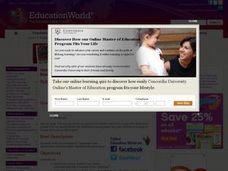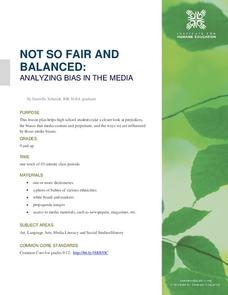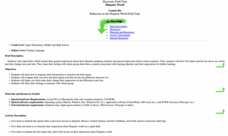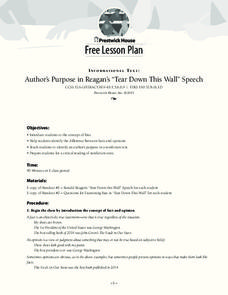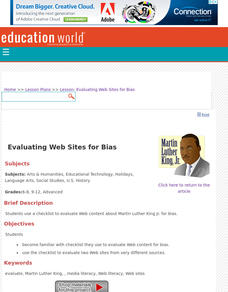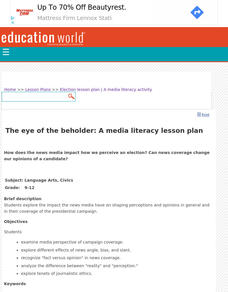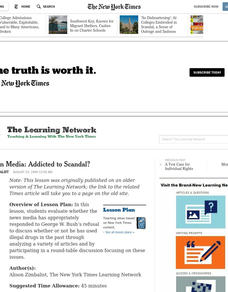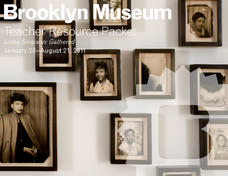Media Smarts
Bias in News Sources
As young consumers of media, it is important for high schoolers to explore concepts of bias and prejudice, and how they may be present in media. After discussing ideological messages that media can contain, individuals complete a warm-up...
Curated OER
Outgroup Experiment Reveals Bias, Stereotyping
Exploring bias and stereotypes, learners dress up as members of "outgroups" (groups of people who are often judged). Though the lesson specifies that it should be "respectful and not mock the outgroup in any way," this activity would be...
Prestwick House
Understanding Language: Slant, Spin, and Bias in the News
We live in a time of fake news, alternative realities, and media bias. What could be more timely than an activity that asks class members to research how different sources report the same topic in the news?
Institute for Humane Education
Not So Fair and Balanced: Analyzing Bias in the Media
Life is not always fair. Who's heard that before? This same concept moves to a larger scale using prejudice and bias. Pupils discuss where prejudice attitudes derive and how they develop throughout life. Reading comprehension...
Curated OER
Looking for Trouble - Using the Internet to Research Structured Controversy
Discuss controversial issues with your charges. More importantly, discuss how you have to research both sides of a controversy before taking a stance. In groups, middle schoolers research the controversial issue of dog sled racing. They...
Curated OER
Hispanic World - Lesson Six
Students explore a Spanish speaking country and compare their research to their initial expectations and biases regarding the Hispanic culture. They share their findings with the class.
Curated OER
A Picture's Worth a Thousand Words
Young scholars analyze the numbers of male vs female administrators and teachers from their school. In this gender equality lesson plan, students use school yearbooks from the 1950's threw present to count how many male vs. female...
Middle Tennessee State University
John Brown: Hero or Villain?
"Love it or leave it." "You're either for us or against us." Rhetoric and it's polarizing effects are the focus of a instructional activity that uses John Brown's attack on Harper's Ferry as an exemplar. Groups examine primary source...
Prestwick House
Author’s Purpose in Reagan’s “Tear Down This Wall” Speech
President Ronald Reagan's "Tear Down This Wall" speech, delivered on June 12, 1987 before the Berlin Wall, provides class members with an opportunity to examine three key aspects of informational text: author bias, the use of facts and...
Newseum
The Press and the Presidency: Friend or Foe? How the President Is Portrayed
In theory, news reports should be fair and unbiased. Young journalists test this theory by selecting a current news story covered by various media outlets about the President of the United States. They then locate and analyze five...
Equality and Human Rights Commission
Negative Attitudes
A study in the United Kingdom found that approximately 60 percent of workers had heard the term gay used as an insult in the professional workplace. Scholars consider discrimination, negative attitudes, tolerance, and stereotypes in the...
Curated OER
Evaluating Web Sites for Bias
Students become familiar with checklist they use to evaluate Web content for bias. They use the checklist to evaluate two Web sites from very different sources.
Encyclopedia Britannica
Campaign Photo Analysis
It's the art of the image! As part of a study of the 2020 Presidential race, groups analyze an image of a candidate, first from an objective point of view and then subjectively. They then prepare a presentation detailing what they...
Newseum
The Women Who Made the Movement
Granting women the right to vote was a long time coming and took many efforts. Young historians select one woman involved in the suffrage movement to research. They compare and contrast the depictions of their subject in mainstream and...
Anti-Defamation League
Hair Discrimination and the CROWN Act
The CROWN Act (Creating a Respectful and Open World for Natural Hair) is the subject of the lesson that asks groups to research the stories of five different women and share their insights in a jigsaw activity. Participants then craft...
Curated OER
What is Islam? Who Are Muslims?
Ninth graders discover Muslim beliefs. In this Islam lesson, 9th graders identify biases and stereotypes about Muslims. Students then research the cultures and traditions of Muslim nations creating PowerPoint presentations that feature...
Curated OER
Mapping Data Made Manageable
Students explore how to select unbiased random samples as they choose report data to include on maps. They propose methods for choosing random numbers and discuss their advantages and disadvantages. They consider bias in science.
Curated OER
Honesty in Writing
Eighth graders analyze the conveyance of honesty in written products. In this writing skills lesson, 8th graders discuss bias and fabrication in writing. Students practice sincere writing as they write statements regarding the common...
Curated OER
An Experiment in Unfair Treatment/Prejudice
A rigged spelling bee gives class members a chance to experience some of the feelings associated with unfair treatment. Team one is given easy words while team two is given difficult words. As teams realize the unfairness the instructor...
University of Chicago
Addressing Stereotypes
How is a stereotype defined, and what are some mechanisms we can use to combat negative stereotyping? Your young historians will discuss how and why stereotyping occurs, as well as consider the roots of modern conceptions of the Middle...
Curated OER
The Eye of the Beholder: A Media Literacy Activity
Students explore the impact the news media have on shaping perceptions and opinions in general and in their coverage of the presidential campaign.
Curated OER
American Media: Addicted to Scandal?
Students examine media coverage of George W. Bush's refusal to answer questions regarding past illegal drug usage in the 1999 campaign. They consider the role of rumor, scandal, audience and relevance in political media coverage.
Brooklyn Museum
Lorna Simpson: Gathered
Lorna Simpson is a photographer who has put together a collection of photos from the 1950s in order to challenge the idea that primary source documents are objective in their portrayal of history. Learners are introduced to Ms. Simpson's...
Curated OER
Charles Darwin Meets John Paul II
If you teach AP English language and composition and are looking for a way to address the differences between written and spoken arguments, consider this instructional activity. Over the course of three days, class members research...



